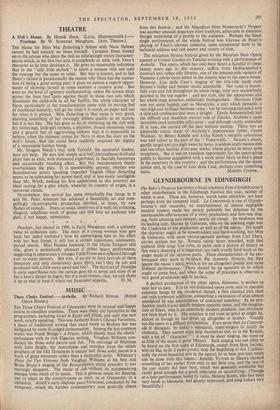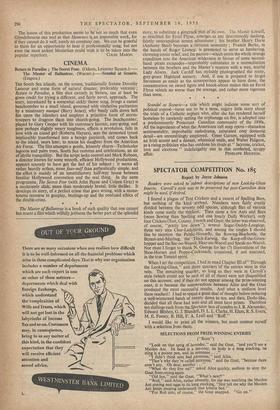GLYNDEBOURNE IN EDINBURGH
The Rake's Progress has stolen critical attention from Glyndebourne's other contributions to the Edinburgh Festival this year, neither of which is new. These are, however, worth some attention, not least perhaps from the company itself. La Cenerentola is one of Glynde- bourne's real successes, an entertainment of almost negligible musical content made not merely palatable but delicious by the inexhaustible effervescence of a witty production and first-rate sing- ing, both amusing and musical, nearly all round. Its weakness was its leading lady, Marina de Gabarain, who on the opening night was the Cinderella of the production as well as of the opera., No doubt the character ought to be downtrodden and hard-working, but Miss de Gabarain, with some encouragement perhaps from Carl Ebert, carries realism too far. Rossini surely never intended, with that pathetic little song Una volta, to paint such a picture of misery as this weary chanting of it suggested, nor such cruelly hard work as the singer made of the virtuoso parts. These characteristics of the per- formance may seem to heighten the dramatic illusion, but they ignore the music's need, which is for an altogether livelier and more brilliant performance. There should be no question as to which ought to come first, and when the order of priorities is observed a very good production will be perfect.
A perfect production of the other opera, Idomeneo, is neither so near nor so easy. It is an old-fashioned opera seria, and its operatio existence hangs by the slenderest thread, a thin classical plot eked out with irrelevant additions, connecting a succession of arias almost unrelieved by any intermittence of concerted numbers. In no pro- duction could it ever satisfy modern operatic tastes, and the imagina- tion of Ebert, who is an essentially modern producer, has obviously not been fired' by it. His solution is not even as good as might be, almost as though he had given up altogether in despair. Vocally too the opera is a difficult proposition. Even more than La Cenerent- ola it demands, by today's standards, super-singers to justify its existence. They cannot even help themselves out, as in the Rossini, with a bit of " character " : it must be sheer singing, the more so as little of the music is great Mozart. Such singing was not often to be heard on the first night at Edinburgh, except from Sena Jurinac, who as Ma, in Se it padre perdei, near the beginning of Act 2 (admit- tedly the most beautiful aria in the opera), let us hear just how much can be done with this music. Jennifer Vyvyan as Electra showed something of her earlier form only in her final aria, and the rest of the cast simply did their best, which was generally creditable but rarely good enough for a work otherwise so unsatisfying. (Though at a later performance, heard by radio, Helmut Krebs, who had been very harsh as Idamante, had greatly improved, and sang indeed very beautifully.) The lesson of this production seems to be not so much that even Glyndebourne can nod as that Idomeneo is an impossible work, for if they cannot do it well, surely no company can. We can be grateful to them for an opportunity to hear it professionally sung, but not even the most ardent Mozartian could wish it to be taken into the



































 Previous page
Previous page